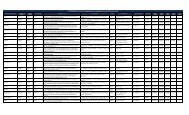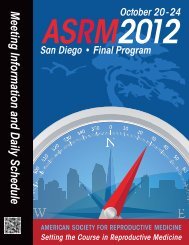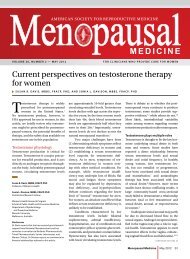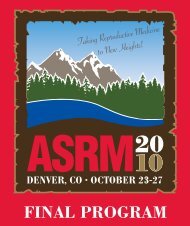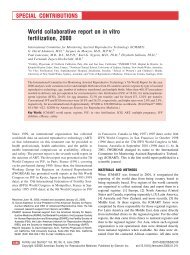scientific program • symposia - American Society for Reproductive ...
scientific program • symposia - American Society for Reproductive ...
scientific program • symposia - American Society for Reproductive ...
You also want an ePaper? Increase the reach of your titles
YUMPU automatically turns print PDFs into web optimized ePapers that Google loves.
44 TH ANNUAL POSTGRADUATE PROGRAM<br />
Developed in Cooperation with the <strong>Society</strong> <strong>for</strong> <strong>Reproductive</strong> Endocrinology and Infertility and the Androgen Excess Special Interest Group<br />
FACULTY<br />
Kathleen M. Hoeger, M.D., M.P.H., Chair<br />
Daniel A. Dumesic, M.D.<br />
Antoni J. Duleba, M.D.<br />
Roy M. Homburg, M.D.<br />
ACGME COMPETENCY<br />
Patient Care<br />
NEEDS ASSESSMENT AND COURSE DESCRIPTION<br />
Polycystic ovary syndrome (PCOS) is one of the most common endocrinologic conditions, affecting 6-8% of women.<br />
Women with PCOS suffer from ovulatory dysfunction and require ovulation induction <strong>for</strong> management of fertility concerns.<br />
There exists confusion over the best management strategies, particularly <strong>for</strong> the use of met<strong>for</strong>min in ovulation-induction<br />
management due to conflicts in the literature.<br />
Designed <strong>for</strong> both primary care and specialist physicians, as well as laboratory scientists, this course will address the use<br />
of ovulation-induction agents <strong>for</strong> PCOS and the debate over the utility of met<strong>for</strong>min use in this setting. Additionally, the<br />
pregnancy complications in PCOS will be reviewed; and management of ovarian hyperstimulation and obesity concerns,<br />
both of which contribute to morbidity in the treatment of fertility concerns in PCOS, will be addressed. Best practices <strong>for</strong><br />
gonadotropin use will be reviewed, as well as the appropriate use of IVF. Finally, emerging technologies with potential<br />
application in PCOS will be discussed.<br />
LEARNING OBJECTIVES<br />
After participating in this course, participants should be able to:<br />
1. Describe the options <strong>for</strong> ovulation induction in PCOS, including whether there is a role <strong>for</strong> insulin sensitizers.<br />
2. List pregnancy complications in PCOS and the impact of obesity on risk.<br />
3. Define the best practices to reduce multiple gestation in PCOS.<br />
________________________________________________________________________________________________________________________<br />
Developed in Cooperation with the <strong>Society</strong> of <strong>Reproductive</strong> Biologists and Technologists<br />
FACULTY<br />
Sangita Jindal, Ph.D., Chair<br />
Carli W. Chapman, B.S., E.L.D., Co-Chair<br />
Dagan Wells, Ph.D., F.R.C. Path.<br />
Kathryn C. Worrilow, Ph.D.<br />
ACGME COMPETENCY<br />
Patient Care<br />
PCOS: A COMPREHENSIVE UPDATE ON FERTILITY MANAGEMENT<br />
Course PG19 (Sunday) <strong>•</strong> ROOM 230 A/B CE<br />
NON-INVASIVE EMBRYO AND SPERM SELECTION:<br />
FROM BASIC SCIENCE TO CLINICAL APPLICATION AND INTERPRETATION<br />
Course PG20 (Sunday) <strong>•</strong> ROOM 330 E/G<br />
NEEDS ASSESSMENT AND COURSE DESCRIPTION<br />
Application of newly developed <strong>scientific</strong> techniques within an ART <strong>program</strong> requires an understanding of the technology<br />
and expertise required to per<strong>for</strong>m and interpret these tests in a clinical setting to improve ART outcomes. Some of these<br />
techniques are simple and some are quite complex, and scientists and laboratory personnel must arm themselves with<br />
the required knowledge to determine if the test is something they can apply clinically within their specific ART <strong>program</strong>.<br />
Research scientists must be aware of the current state of the techniques to determine if these techniques can be<br />
incorporated into their area of research to further advance the field.<br />
This course will review the basic science and clinical applications of complex <strong>scientific</strong> techniques, increasing the ability of<br />
research scientists and laboratory personnel to incorporate them into their specific area of research and/or clinical practice<br />
as an in-house or outsourced technique. Required resources and expertise <strong>for</strong> each technique will be addressed.<br />
LEARNING OBJECTIVES<br />
After participating in this course, participants should be able to:<br />
1. Discuss metabolomic technology and assess the pros and cons of each metabolite tested.<br />
2. Analyze benefits vs. cost and expertise in determining whether to do this test in-house or select a reference laboratory.<br />
3. Discuss proteomic technology and assess the pros and cons of proteomic profiles.<br />
4. Describe sperm chromatin assays and explain the effects of impaired sperm on IVF outcomes.<br />
________________________________________________________________________________________________________________________<br />
53<br />
CME



